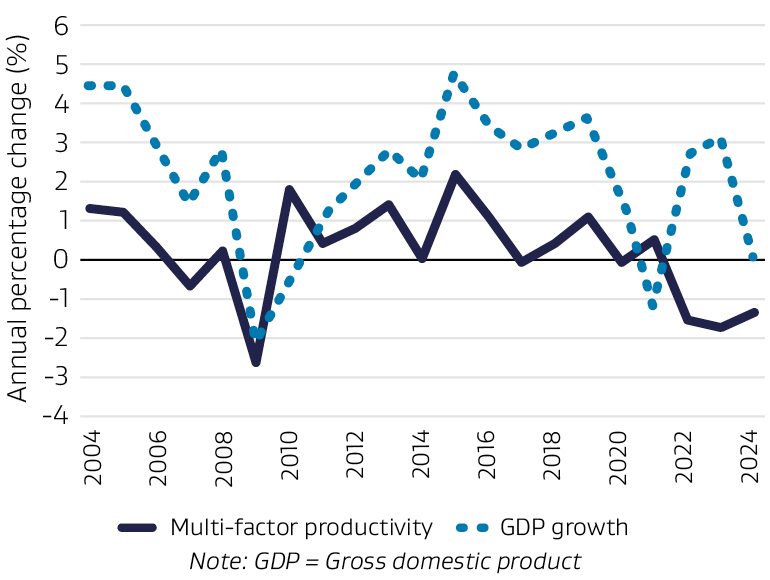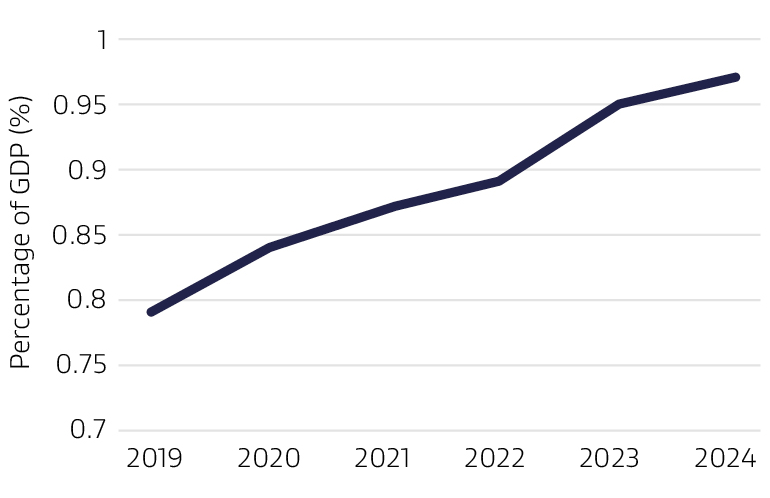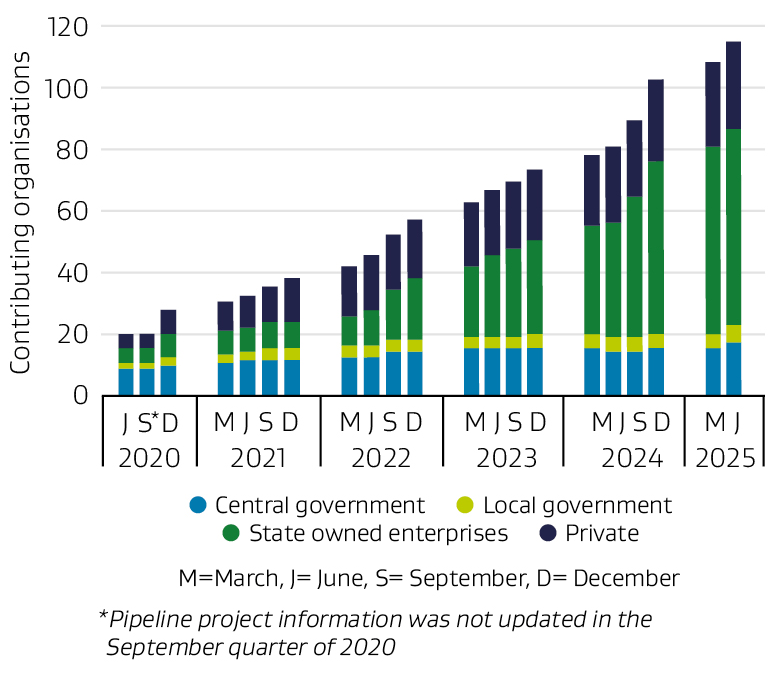Government priorities
MBIE supports the Government of the day in delivering core priorities, including the Government’s quarterly action plans, as well as economic strategies and policies.
On this page I tēnei whārangi
Going For Growth
Since the start of 2025, we have been supporting the Government in delivering Going For Growth, which sets out the Government’s approach to making New Zealand’s economy grow faster and increasing opportunities for all New Zealanders. It consists of actions organised around five pillars. MBIE plays a significant role in progressing work under each pillar. We track key metrics (see graphs) to understand progress over the long term.
Pillar 1 - Developing talent
Developing the human capital we need to create more and better-paying jobs for New Zealanders, so businesses can access the skilled people they need to grow. MBIE’s actions include:
- immigration settings – introducing changes to attract the skills and talent the country needs
- regional investment – growing regional economies by improving resilience and increasing productivity.
Gross Domestic Product (GDP)

Pillar 2 - Competitive business settings
Cutting the red tape that holds back sensible, innovative businesses from growing, while ensuring we have rules that foster competition between firms to deliver a better deal for consumers and encourage investment. MBIE’s actions include:
- employment settings – progressing work on employment relations legislation, including progressing reforms to the Holidays Act 2003 and Employment Relations Act 2000, to simplify them, give businesses certainty and reduce compliance costs (see page 24, for more details)
- competition – conducting reviews of the electricity, banking and grocery sectors, and progressing work on legislation to streamline financial services regulations.
Productivity statistics

Pillar 3 - Promoting global trade and investment
Strengthening New Zealand’s trade relationships and promotion of New Zealand as open for business, so the value of exports is doubled within the next 10 years and capital intensity is lifted. MBIE’s actions include:
- growing tourism – developing the Tourism Growth Roadmap to boost international visitors and doubling export value in the next 10 years
- minerals and resources – implementing the Minerals Strategy for New Zealand, ensuring the sector can grow and contribute positively to New Zealand’s economic prospects
- investment – working with New Zealand Trade and Enterprise (NZTE) to establish Invest New Zealand as a one-stop shop to attract foreign direct investment.
International trade

Pillar 4 - Innovation, technology and science
Making it easier for New Zealand businesses and industries to pursue innovation, lift capital intensity and connect the science system to the needs of a growing economy. MBIE’s actions include:
- science system – reforming the innovation, technology and science system, including setting up four new public research organisations and establishing the Prime Minister’s Science, Innovation and Technology Advisory Council to enable prioritisation and focus across the system
- gene technology – introducing legislation to remove the gene technology ban and establish a gene regulator.
Business research and development expenditure

Pillar 5 - Infrastructure for growth
Changing how modern infrastructure is planned, funded and built, and unlocking access to more private capital for major infrastructure projects, to lift productivity and living standards. Focusing on housing growth to improve housing affordability. MBIE’s actions include:
- energy – facilitating a greater and more resilient energy system
- regional infrastructure – considering and approving investments made by the Regional Infrastructure Fund, contributing to regional economies and creating jobs
- streamlining building – enacting legislation to allow more overseas building products to be used and improving the building consent and planning system to make it easier to build homes.
National infrastructure pipeline

Implementing fiscal priorities
MBIE’s baseline was reduced by $56 million in 2024/25 through the Budget 2024 Initial Baseline Exercise.
We achieved these savings from general operational efficiencies and reductions in discretionary spending for back-office functions, including property, information technology, data and insights, legal, human resources, finance, communications, and strategy services within the Ministry.
Savings were also achieved from ending and scaling back programmes that were not aligned with the Government’s priorities. For non-departmental expenditure, the following baseline savings of $152 million were made:
- overall, around $105 million saved in 2024/25 from the Science, Innovation and Technology portfolio, comprising a combination of time-limited and permanent saving reductions through reduced research and operational funding
- just over $13 million saved in 2024/25 of New Zealand Trade and Enterprise operational funding and from the International Growth Fund
- just under $9 million saved in 2024/25 from the Tourism and Hospitality portfolio, with around $6 million relating to Marketing New Zealand as a Visitor Destination
- just under $8 million saved in 2024/25 from the Energy portfolio due to discontinued programmes and funds, as well as scaling down other programmes
- overall, just over $7 million saved from the Economic Growth portfolio in 2024/25 from the return of funding from various programmes, funds and forums
- just over $3 million saved in 2024/25 of Commerce Commission funding due to reduced contractor and consultant expenditure, a slowing of activities on the fuel and retail payment regulatory regimes, as well as competition studies, and efficiency gains across the Commission
- the remaining savings of just under $7 million are from initiatives returning funding in the Building and Construction, Commerce and Consumer Affairs, Small Business and Manufacturing and Workplace Relations and Safety portfolios.
In addition to the above savings in 2024/25, there was an initiative of just under $1 million relating to Employment Services and Equivalent Increase in Immigration Fees and Levies.
MBIE incurred a contractor and consultant operating spend of $30.622 million in 2024/25, which represents 4.6% of total departmental workforce expenditure and a reduction of $24.4 million from the previous year. This compares with expenditure of $89.847 million and $55.019 million for 2022/23 and 2023/24 respectively, which represent 12.8% and 7.5% of total departmental workforce expenditure in these years respectively.
Major spending decisions and budget significant initiatives
Each year, MBIE is provided with funding from the Government to deliver significant initiatives in response to current or ongoing challenges facing New Zealand.
In Budget 2024, Cabinet agreed to 11 major spending decisions across government. This included over $1.2 billion in funding to support economic development opportunities and infrastructure in regional New Zealand through the Regional Infrastructure Fund (RIF). As part of this, $200 million in funding was made available to the RIF for flood resilience projects across the country. Other priority areas include energy security, enabling infrastructure, Māori economic development, and resilience. An additional $18.4 million per year was approved for ongoing contract management and evaluation, and management of various other regional funds and investments. Regional development is critical to improving resilience, increasing productivity and growing regional economies.
More information about the RIF
The items below reflect several Budget significant initiatives that are important to the Government’s and MBIE’s strategic priorities, as well as Parliament and the public.
- The Government is undertaking significant reforms to New Zealand’s science, innovation and technology system to improve economic outcomes and harness advanced technologies for a more prosperous future.
- In total, $20 million dollars has been invested to establish public research organisations through the merger of seven Crown research institutes, and $38 million for the wind down and transfer of functions from Callaghan Innovation over the next three years. The establishment of the new Prime Minister’s Science, Innovation and Technology Advisory Council ($5.8 million over the next 5 years) will provide advice on long-term priorities for government- funded science and innovation in New Zealand.
More information about these reforms - New industries, and supporting them to grow and develop, create jobs and bring investment to New Zealand shores. The New Zealand Screen Production Rebate remains a cornerstone of support for the country’s creative industries. It enables international productions to contribute meaningfully to the growth and sustainability of the domestic screen sector and workforce. In Budget 2025, the sector received increased baseline funding of $63.8 million, as part of a broader five-year investment totalling $576.9 million.
More information about strengthening key industries - The Government set aside $200 million in contingent funding for co-investment in new gas development over the next four years, to secure New Zealand’s energy supply.

